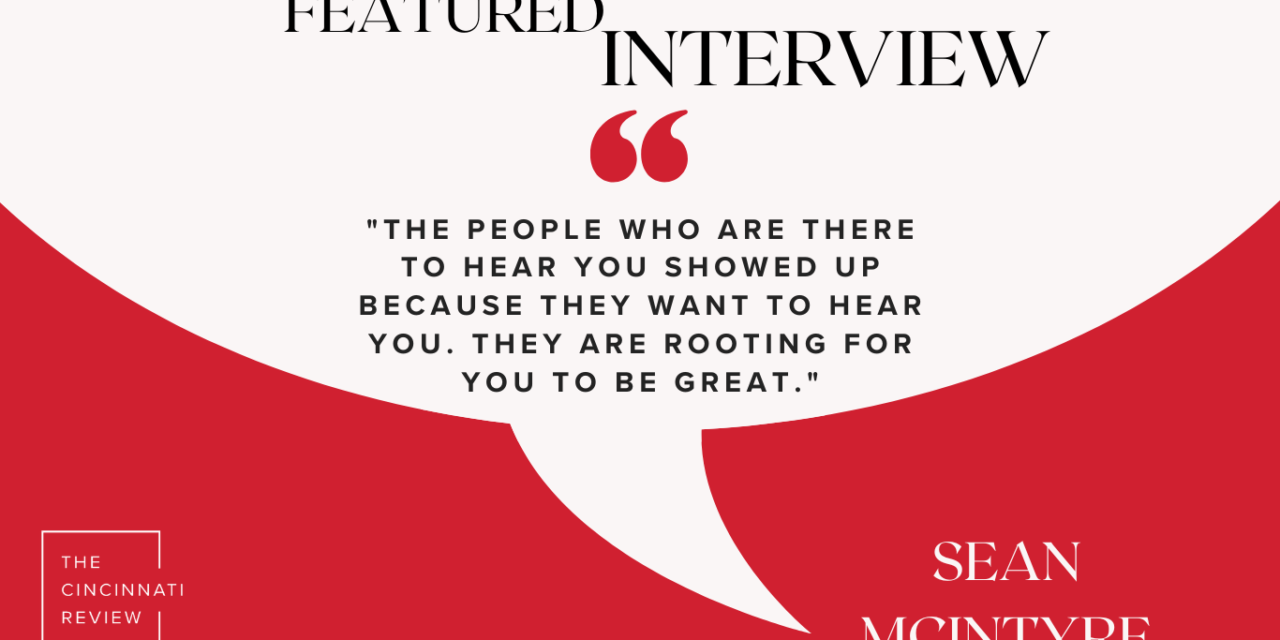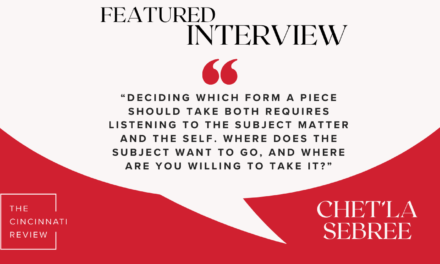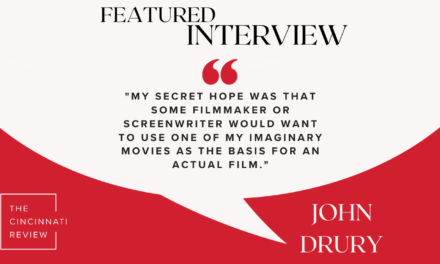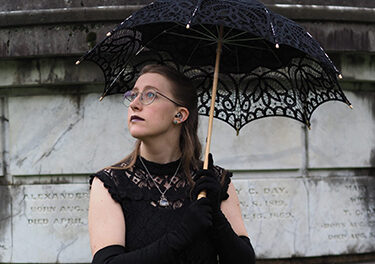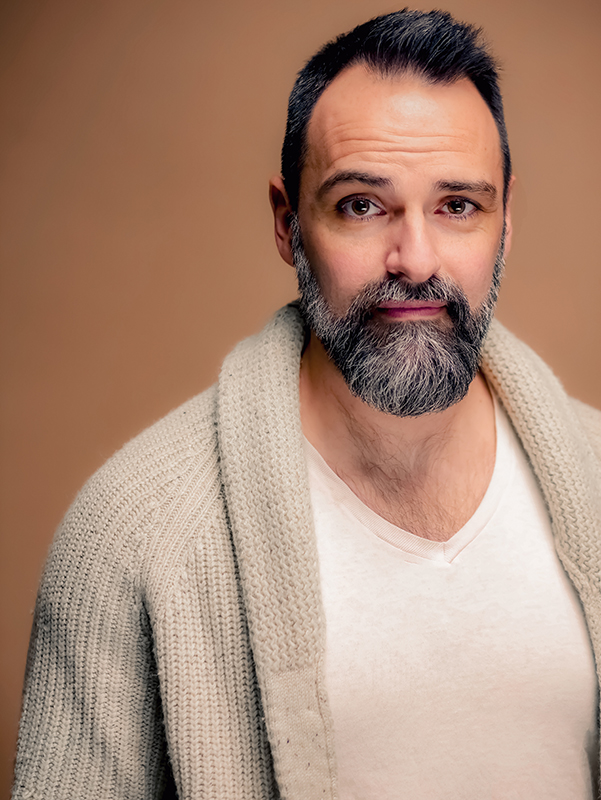
Assistant Managing Editor Bess Winter: You have to give a reading…and you’re terrified. Or you leave a reading and realize you can’t remember anything about what the author actually read. Or you’ve just given a reading and the whole thing was a blur: you read way too quickly, flubbed some of your lines, didn’t drink enough water, shook the whole time (oh my gosh, could people see that you were shaking?). If this feels at all familiar to you, acting techniques might be your best friend. I spoke with Sean McIntyre, actor, coach, and co-owner of Performing Prose, a coaching service for writers who need to appear in front of an audience, about how prose writers can harness acting skills to make their readings as engaging as their writing.
As an actor, you’ve done work across a lot of media—everything from stage to screen to audiobooks to video game voice-over (motion capture?) work on Red Dead Redemption II. How do these forms of acting inform each other, for you? Do any roles or gigs stand out to you as favorites?
That’s a great question, because all of these different media do require specific sets of skills. You might bring every person in a two thousand seat theater to tears with a performance and be laughed off a film set for being so wildly over the top with the exact same performance—and vice versa! Scale aside, I think the main thing that connects all forms of performance comes down to authenticity: who is the person behind this performance? Are these just ideas, pretty words and pictures? Or is there a real human being behind this work, one that I can connect with, see myself in?
And of course there are techniques you learn in one medium that inevitably inform the way you prepare for others. For example I use a massive amount of my Shakespeare training in my voice-over work. By that I’m not referring to the timbre of my voice, but my approach to the text itself. Since Shakespeare uses so many words it’s up to the actor to mine the text for the important information and to “lift” it from the rest of the text to clarify the story for the audience. With voice-over, since there are no visuals to help tell the story, I take a similar approach. This can (and should) be applied to readings! It is one of the main techniques we offer to our authors when we teach Performing Prose.
It’s hard to pick a favorite role, but I definitely prefer collaboration over working on my own, especially on new plays. While I love my VO work, there’s nothing quite like working through a new script with your fellow actors and discovering all of its secrets.
Do you remember the first time you recorded an audiobook? What did you learn from that experience? It seems as though the marathon recording sessions that audiobook narration requires would feel quite different from, say, shooting a TV show.
Very different indeed! The first thing that comes to mind when comparing those two particular platforms is discipline. While both jobs are extremely rewarding (and exhausting!), when you’re on a TV set there are whole teams of people whose job it is to make sure you are where you’re supposed to be when you’re supposed to be there, looking and sounding how you’re supposed to look and sound. It’s also not uncommon to work a fourteen-hour day just to deliver three lines. With an audiobook you are the actor, the producer, the director—everything. While that certainly has its appeal, it is also very easy to get distracted, take extra breaks, have a snack, watch an episode or five of The Great British Baking Show, and suddenly I have to be in the recording booth until 1 a.m. to make my deadline.
And to answer the first part of your question, while I don’t have a ton of audiobooks under my belt I have learned immensely with each new project. I actually find recording similar to the experience of writing, in that some days I’ll be on a roll and not even realize I’ve been working nonstop for the past five hours, and other days I’m hardly able to muster a single paragraph. And on those days, I just try to forgive myself, and allow myself to be where I’m at that day.
Also water. Drink lots and lots of water.
Many prose writers compose extraordinary, vivid work, but when it comes time to stand in front of an audience and read it they’re at a loss. Everyone who’s been to a number of readings has been to many (if not most) where the reader is looking down at the page the entire time, or appears to be really nervous, or reads quickly, in a monotone. How would you suggest writers who may not have any acting experience gain the confidence to read in a way that engages their audience? Do you have any tips or tricks for people who are nervous, for example?
It’s something we hear so often from writers we work with: “I don’t want to come off as self-indulgent, or flashy.” They feel that to do anything more than read their piece flatly is to show-boat, and they prefer to let the words speak for themselves. I am here to tell you: the words will not speak for themselves. We need your help! Our ears crave variety, and no matter how beautiful your writing is (and if you’re reading this your writing is likely very beautiful), if it’s read without inflection we will not be able to absorb it.
Stepping up in front of a group of people to read your own writing is a profoundly vulnerable thing to do. Not only have you written something beautiful, but you are giving the gift of sharing that beauty with the world. To then back away from it and read it without any of the nuance with which you wrote it is to apologize for the very gift you’re giving. I say no apologies! The people who are there to hear you showed up because they want to hear you. They are rooting for you to be great. So lean into those juicy words, take your time with them, give the gift fully, as you wrote it, and I promise it will be well received.
As far as nerves—breath is everything. So many people forget to breathe while they are performing, and it makes such a difference. Make a general practice of breathing deeply into your diaphragm. Before going on stage, take a few long breaths in through your nose, out through your mouth with long, controlled exhales. Warm up your articulators with some tongue twisters before leaving the house. Do a physical warm-up; connect with your body and the breath will come naturally.
And when it comes to connecting with your audience—as you mentioned in your question—we need eye contact, especially at the very beginning of your piece. It tells the audience it’s okay to take you in, and thus okay to take in your words. If you don’t let us in, at least a little bit at the top, we feel excluded from the whole performance, excluded from the gift.
Do you think some pieces lend themselves to being read aloud better than others? What should a reader think about when choosing a piece of fiction or nonfiction to read aloud?
I love when authors share a piece with dialogue. We get a real sense of their characters—what they say versus what they are thinking — and it gives the reader a chance to differentiate vocally. I also think turning points are inherently captivating: revelations, plot twists, big surprises.
That said, these choices are extremely personal. More than anything I recommend choosing a passage that you are proud of, one that you enjoyed writing and that you enjoy rereading, one that—dare I say it—might even be FUN to read out loud.
As a creative writing teacher, I often tell my students that one of the best things they can do for their craft is to take an acting class. If a writer who’d never acted before wanted to dip their toes into acting, where or how would you suggest they start?
Bless you for giving that advice! Another thing we often hear from writers is how much the work we do with them on performance ends up impacting their actual writing.
There are endless resources for beginner acting classes. Most community centers and colleges offer such programs. If you’re struggling to find something in your area there are plenty of online classes you can take. Masterclass also has some fantastic lectures if you’re just looking to take things a little more slowly and want to start with observation. If nothing else, you can always get together with some other writer friends and read through some plays out loud. Then change parts and read through it again! Be silly, be playful, have fun with it.
Readings should be fun. As we always tell our clients: you’ve already written the thing; the hard part should be over.
Sean McIntyre is a New York based actor and educator. His recent performance work includes film, international television, Broadway and off-Broadway stages, and extensive work in commercial and theatrical voice-over. He is a teaching artist with Rehabilitation Through the Arts, where he works with incarcerated individuals on developing critical life skills through an artistic approach, and is currently co-directing a production of Keenan Scott II’s Thoughts of a Colored Man at Green Haven Correctional Facility. He is a Professor of Acting at Adelphi University, and has been an actor/instructor at The Sewanee Writers’ Conference since 2017.

